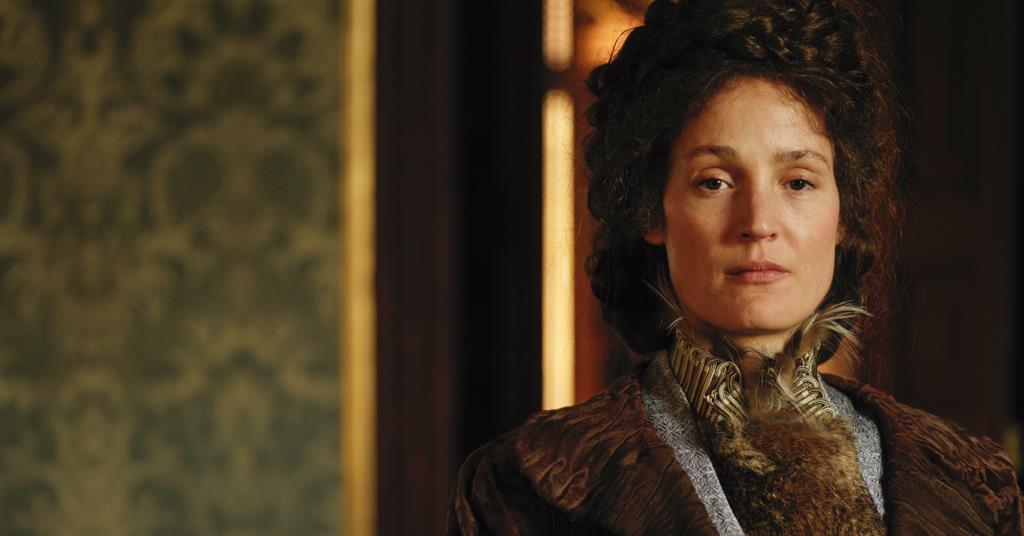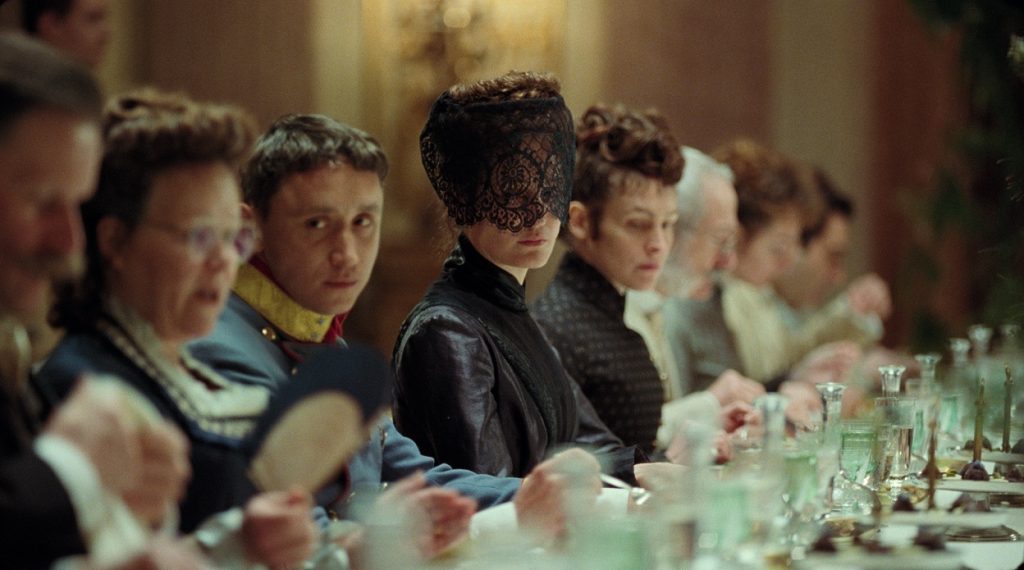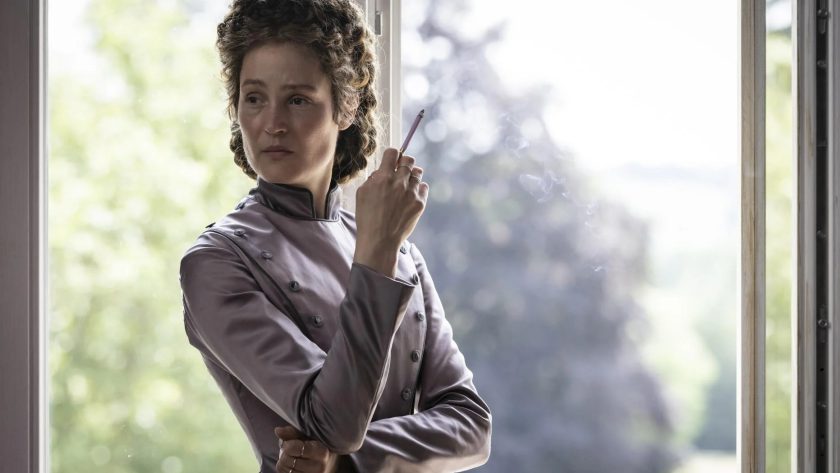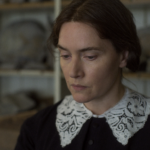BFI’s London Film Festival is in town! The FilmSoc Blog is back for the 66th edition of the city’s largest film festival, delivering a look at the hits and misses of the 2022-23 season.
◯ Warning: this review contains spoilers.
Aryan Tauqeer reviews Marie Kreutzer’s Corsage, a revisionist biological drama about the Empress Elisabeth of Austria.
In Marie Kreutzer’s Corsage, one of a litany of revisionist biographical dramas that seek to wrench screams of agony from the effacing demeanour of the past, there are not disturbances in the gilded cage of royalty as much as there are intermittent assertions of composure in a whirlwind of insubordination. Like many other inhabitants of the framework Pablo Larrain’s portraits of grief have (to largely uninspiring effects) inspired, the film contextualizes aristocratic respectability through the eyes of an avatar of disaffection with that very period. In this particular instance, it is Vicky Krieps’ rendition of Empress Elizabeth of Austria, subject of five prior Austrian-German adaptations and honorary member of the Habsburg lineage (by virtue of her marriage to Emperor Franz Joseph I). Krieps’ rendition of the Duchess affectionate known as Sisi is a beacon of animated-ness, in stark contrast to the Neoclassicist portraits that royally-appointed painters craft of her. Much like the corsets (which translates to corsage in French) she wears that are gradually tightened to an almost suffocating extent, Elisabeth’s portraits constrain her by entrapping her within the grinding wheels of time that she seeks so desperately to escape. It is therefore no wonder that she is drawn to the burgeoning technology of the moving picture, whose innumerable frames provide her with an endless avenue of green to walk upon. It is in these sparse moments of sublimation that the film’s painfully-recreated period trappings fall and Krieps is positioned as the film’s emotional centre- it is disappointing, then, that littered in between these moments is the structure of an often embarrassingly homiletic script.

Upon witnessing Krieps’ usage of a cigarette as an instrument of quiet defiance, one recalls the inimitable Marlene Dietrich’s dual turns as royal subject and state consort respectively in The Scarlett Empress and Dishonored. Like Dietrich, Krieps’ performance upholds a certain steely poise that is guarded but not cold- even when she is framed regally, as the centre of the frame drawing infirmed soldiers and upper-class guests likewise towards her, she simultaneously evokes a certain roguish charm that renders her magnetic to watch. Similarly, the way in which the cigarette is contextualized as an instrument of warring impulses in the films of von Sternberg is similarly wielded by Elisabeth as a show of defiance- in one of the film’s tensest sequences, Elisabeth gracefully lights a cigarette at dinner as her husband gawks at her in a tenuous mix of bewilderment and indignation. The camera tracks her walking across the room as not an Empress but as a disaffected woman whose patience has finally been maximized. Though the lens of the camera bears a certain reverence to Krieps, it does not refrain from spurning her either-much of Corsage’s most piercing emotional beats stem not from an overbearing application of diegetic music but from mere glances that are held on to for long enough that the accusations implicit in them are directed towards us as well as Elisabeth.
In its incorporation of Kris Kristofferson’s Help Me Make It Through The Night, and as a work of revisionist fiction centred across a re-examination of royalty, Corsage might be seen as analogous to Sofia Coppola’s Marie Antoinette, the latter of which has a similar degree of playful irreverence towards its subject matter. What distinguishes the two, however, is that Coppola’s film is hermetically-sealed in its form- everything from the film’s costume design to its soundtrack is designed to mould a sphere of fantasy, where the rigidity of loyalty coexists with the freedoms it allows.

Corsage, however, largely remains within the confines of a history textbook, in that its staid refusal to stray from the formal structure of the biopic- which is, more often than not, a visual translation of a Wikipedia article- continually restrains the film from taking more intriguing digressions. Elisabeth’s attempt to relinquish her royal duties by appointing a trio of doppelgangers, one of the more compelling manifestations of the film’s concerns with identity, is one of the few instances in which the emotional turmoil she undergoes takes the form of images, as opposed to varied and equally tiresome monologues that litter the rest of the film. The frigidity of its framing, however, is not without reason- though the film is littered with the specks of shining metal that characterizes opulence, they exist as a collection of minute respite against the drab, lifeless palace walls that enclose Elisabeth. In a similar vein, the seeds of a thematic digression towards decay are sown when Elisabeth, visiting a war hospital, lights a cigarette (to the comic bemusement of the doctor escorting her), and lays down next to a patch-stricken soldier, offering him a cigarette. She therefore discovers renewal and purpose in places that seem to suggest loss and deterioration. Krieps’ magnetism is palpable, and yet rather than allowing her room to indulge in reshaping history, the camera seems all too restrictive in its binding of Elisabeth to notions of performative defiance that seem fundamentally opposed to Krieps’ fluidity as a performer.
In attempting to loosen the shackles of satin that bound the real Empress Elisabeth, Corsage’s reimagining of the monarch as a woman unbound by the dreariness of royal duty is perhaps most effective in its re-envisioning when it refuses to conform to the stuffiness of the costume drama, weaving its own flighty fable of an Empress who recognized the potential of the motion picture long before anyone else, and whose veneer of satisfaction in the presence of her impotent husband was enabled only by a heroin addiction. It is precisely the scarcity of these moments, then, that renders the film a heady, uneven combination of fact and fiction, whose ambitions outstrip its formal flatness.
Corsage will be released in cinemas on December 30th, 2022. Watch the trailer here:




